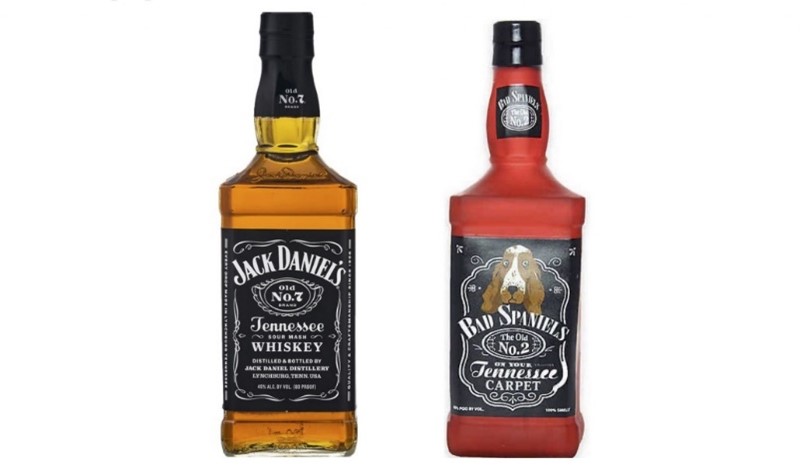On Wednesday, March 22, 2023, the Supreme Court heard oral arguments in Jack Daniel’s Properties, Inc. v. VIP Products LLC (Docket 22-148), a case involving Jack Daniel’s Tennessee whisky and a novelty dog chew toy. The Court was asked to evaluate the intersection between trademark law and free speech under the First Amendment. The arguments and the justices’ questions were filled with hypotheticals and subject matter references that triggered laughs throughout the courtroom. The Court appears split, but its decision could have significant implications for brand owners and parties interested in using another’s trademark for parody or other humorous uses.
Old brands, new tricks
Jack Daniel’s is a longstanding and well-known brand of Tennessee whiskey. VIP sells a dog chew toy that mimics Jack Daniel’s distinct square-bottled whiskey and incorporates a similar label to Jack Daniel’s in terms of shape, color, and font. Playing on the “Jack Daniel’s” name and “Old No. 7 Tennessee Sour Mash Whiskey” description, the dog toy features the name “Bad Spaniels” and description “The Old No. 2 on your Tennessee carpet.” The dog toy also includes the language “43% POO BY VOL.” and “100% SMELLY.”

Jack Daniel’s sued VIP for trademark infringement and dilution. VIP argued that its use is protected free speech. The district court found in favor of Jack Daniel’s and held that VIP’s use infringed and tarnished the Jack Daniel’s brand. The Ninth Circuit reversed the lower court’s decision and determined that VIP’s use was protected by the First Amendment. The circuit court relied on the test established in Rogers v. Grimaldi, 875 F.2d 994 (2d Cir. 1989), which provides First Amendment protections to works that use third-party trademarks, so long as the work is considered “artistically expressive” and does not “explicitly mislead” consumers. Applying Rogers, the Ninth Circuit found VIP’s use of the Jack Daniel’s marks to be humorous and expressive and thus, protected free speech. Jack Daniel’s petitioned the Supreme Court to review the holding.
The questions before SCOTUS
The Supreme Court was presented with the following questions:
- whether humorous use of another’s trademark as one’s own on a commercial product is subject to the Trademark Act’s traditional likelihood-of-confusion analysis, or instead receives heightened First Amendment protection from trademark infringement claims; and
- whether humorous use of another’s mark as one’s own on a commercial product is noncommercial and thus bars as a matter of law a claim of dilution by tarnishment.
During oral arguments, Jack Daniel’s argued that the Trademark Act should control and that there is no exception for expressive works in the text of the Trademark Act. Jack Daniel’s further argued that Rogers does not apply, and that VIP’s dog toy is a commercial product that is likely to cause consumer confusion and dilute Jack Daniel’s brand and harm its reputation. VIP argued that its use is a parody and that a parody by nature is noncommercial and expressive. VIP also argued that the Rogers test should be upheld and act as an initial screen in cases like this to determine whether something is an artistic expression and therefore protected by the First Amendment before moving on to the question of whether there is a likelihood of confusion. The justices’ questions indicated hesitancy for a broad application of the Rogers test, but concern for doing away with Rogers altogether and the potential stifling of speech.
What’s next?
The Supreme Court anticipates a decision in June. In addition to answering the questions presented, the Court’s decision may have greater policy implications. A ruling in favor of Jack Daniel’s position could completely remove First Amendment protections from a trademark infringement analysis, whereas a ruling in favor of VIP could weaken trademark owners’ rights and allow for widespread unauthorized use of another’s trademark so long as it is humorous. The oral arguments suggest that the decision is likely to be narrow and more in the middle. Brand owners and users should stay (sit, roll, fetch) tuned.
